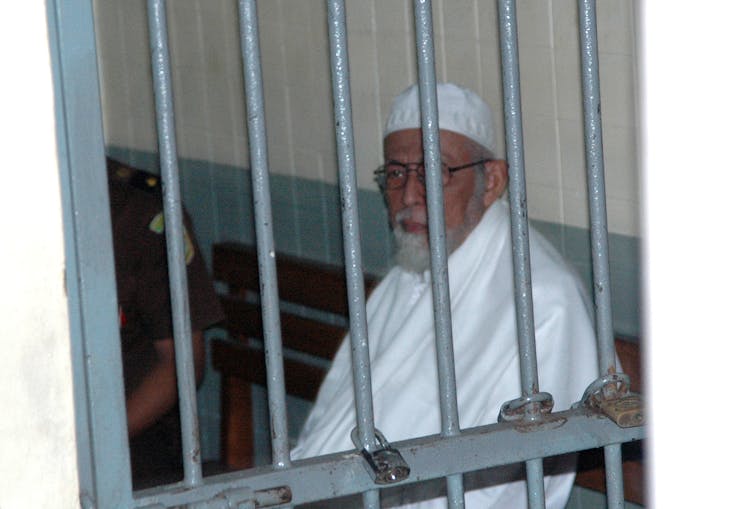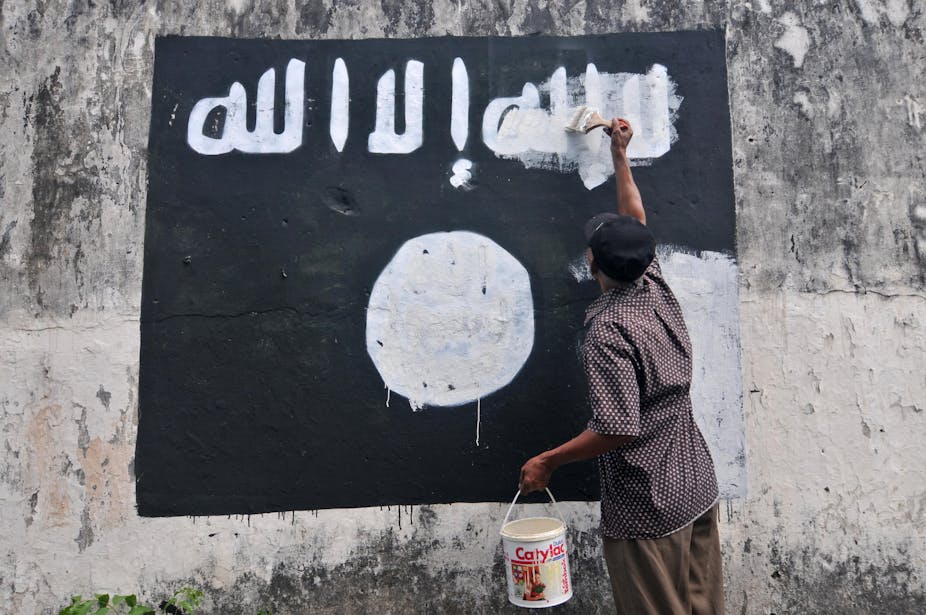The Indonesian government recently banned Islamic State (IS) – formerly known as Islamic State of Iraq and Syria (ISIS) – the extremist group that has been on a rampage in Syria and Iraq. The Indonesian Ulema Council (MUI) has released a statement that IS’s interpretation of jihad is not in accordance with peaceful Islamic teachings.
The government ban and the clerics’ statement are positive moves. But they are inadequate to stop young religious radicals from joining IS.
The government must actively target young extremists to disengage them from radical groups. The government should also reform the prison system where the most influential convicted terrorists are kept.
Failure of prisons in rehabilitating terrorists
Criminalising membership of extremist groups has failed to stop convicted terrorists from spreading their views and gaining recruits from within prison. Being imprisoned did not stop Abu Bakar Bashir from calling for Indonesian jihadists to support IS. Another jailed terrorist, Aman Abdurrahman, has been translating and distributing IS publications on the internet.
At least 40 of 400 convicted terrorists in Indonesia who served time went straight back to their former violent ways. Some took part in the second Marriott Hotel bombing in Jakarta in 2009. Others joined some very radical Islamic groups in other parts of the world including Iraq and Syria.
The reason: there has been no systematic and comprehensive initiative to counter the evolution of terrorism threats coming from jailed terrorists.

Among contributing factors to the failure of rehabilitation of convicted terrorists are: overcrowding in Indonesian prisons; lack of financial support for the running of prisons from central governments; and under-performing staff.
With these poor conditions, the wardens tend to focus on security issues and ignore rehabilitation of inmates, such as de-radicalisation programs.
The police has started to arrest a number of IS supporters, including Afif Abdul Madjid, a senior figure in Jama'ah Anshorut Tauhid (JAT), a jihadi organisation led by Bashir. However, with the prisons in their current state, even if convicted, Afif might be able to attract recruits for IS from behind bars.
Afif publicly claimed to have gone to Syria to pledge bai'at (allegiance) to senior IS members early this year. His visits to Syria have increased his standing and influence over recruits. His sermons in a number of mosques in Jakarta, Solo and Surabaya have been attended by hundreds of Islamic activists who dream of living under an Islamic caliphate and would be willing to travel to Syria to join IS if they could.
The government should reform prisons, especially those that have been used by terrorist ideologues as a base to produce more committed members. The prison system is one of the weakest links in today’s counter-terrorism efforts in Indonesia. Prison staff must stop the translation of jihadi books and manuscripts from within prisons as well as the ease with which inmates can use smartphones.
Why the young join extremists groups
There is no single reason for members to join IS. The common reason would be performing jihad. But in many cases there is some degree of economic motives too.
I interviewed one of Indonesia’s fighters with IS this year through Facebook. A former fighter in Muslim-Christian conflict in Indonesia’s Poso region, he said he went to Syria early this year. He joined IS straight away through contacts from former Poso fighters already in Syria.
For his travels, he borrowed money from a friend. As an IS recruit, he receives a “salary” of $250 per month and uses some of the money to repay his loan.
His first IS posting was in Raqqa. Then he moved to Idlib and Aleppo. He is now in the city of Jarabulus. His main job is to look after the camp, cooking and patrolling the city’s border. Sometimes he fights at the battlefront.
Jihadists like my interviewee argue:
We are not joining a terrorist group like al-Qaeda but we are supporting an Islamic caliphate as part of a prophet’s prophecy that will emerge every 100 years.
A government ban on IS would not be enough to challenge religious arguments presented by jihadists to young extremists.
The government should work to promote a renewed sense of personal identity to disconnect individuals from the beliefs of the group they have internalised. This can be achieved by providing them with creative citizenship engagements, such as critical thinking training, with the help of civil society activists, community leaders and religious figures.
Up to this point, there is no immediate security threat such as bombings, shootings or killings by IS supporters in Indonesia. However, the Indonesian government must improve its intelligence and surveillance activities. Those who are marching in the street and unfurling IS flags in public demonstrations must be seen as notable individuals who could potentially move on to actual violence.
Young recruits are often lured by the group’s ideology, which seems to them to explain a complex and disappointing world. It justifies violence to overcome their feeling of powerlessness, which stems from factors ranging from economic and educational marginalisation to job opportunities.
Their commitment to the cause does not always increase. In fact it often decreases. Some might eventually disengage from the group, especially after they are faced with the reality of how dirty, tricky and cruel life is under violent groups like IS.

